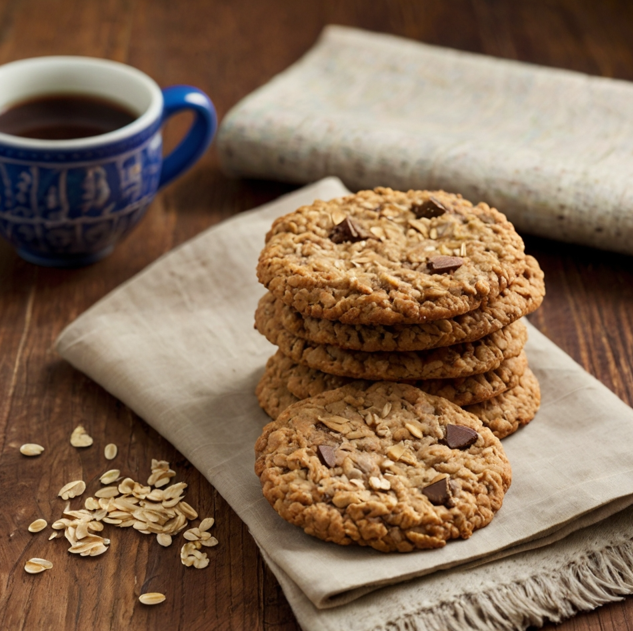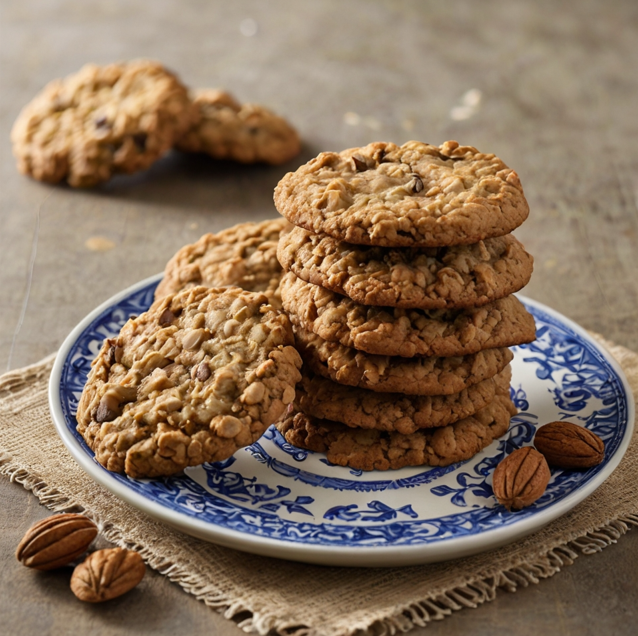A Brief History of Quaker Oatmeal Cookies
Origin of Quaker Oats and Its Legacy
Quaker oatmeal cookie recipe enthusiasts rejoice! This guide is your go-to resource for baking the perfect cookies using Quaker oats. Packed with tips, variations, and health benefits, these cookies are a classic dessert that’s easy to customise and enjoy. Whether you’re new to baking or a seasoned pro, this recipe will help you create delicious and wholesome treats every time.
The company’s innovative packaging, including the now-iconic cylindrical box introduced in 1915, set Quaker apart. It also played a role in making oats a pantry staple in homes worldwide. Quaker’s dedication to quality, sustainability, and community health has made it a household name for over a century, shaping the way people consume oats today.
How Oatmeal Cookies Became a Classic Dessert
Oatmeal cookies emerged as a popular treat in the early 20th century, combining the nutritious qualities of oats with the sweetness of dessert. The first recorded oatmeal cookie recipes appeared in the late 1800s, and by the 1920s, oatmeal cookies had become a staple in American kitchens.
The introduction of raisins, spices, and nuts into oatmeal cookies elevated their status as a versatile and satisfying dessert. During the Great Depression and wartime rationing, oatmeal cookies gained further popularity as oats were affordable and readily available. Their combination of nutrition and comfort made them a beloved choice, embodying both indulgence and practicality.
Why Quaker Oats are the Go-To Brand for Oatmeal Cookies
Quaker Oats has long been the preferred choice for baking oatmeal cookies due to its reputation for high-quality oats. The brand’s consistent product quality ensures reliable results, whether in traditional recipes or innovative variations. Quaker Oats’ marketing has also played a pivotal role in cementing its place in the world of oatmeal cookies, with recipes often featured directly on the packaging.
Moreover, Quaker’s commitment to health and wellness aligns with the wholesome image of oatmeal cookies. By offering a range of oats, including quick-cooking and steel-cut varieties, Quaker provides options to suit every baker’s preference. This versatility, combined with the company’s trusted legacy, makes Quaker Oats the go-to brand for creating the perfect oatmeal cookie every time.
The Health Benefits of Oats in Your Cookies
Nutritional Profile of Oats
Oats are a powerhouse of nutrition, making them an ideal ingredient in your favourite oatmeal cookies. They are rich in complex carbohydrates, providing long-lasting energy, and packed with dietary fibre, particularly beta-glucan, which is known to lower cholesterol levels. Oats also contain a range of essential vitamins and minerals, such as manganese, magnesium, iron, and B vitamins, contributing to overall health and wellbeing. Additionally, oats are a great source of plant-based protein, making them a nutrient-dense base for any dessert.
How Oats Improve Digestive Health

The fibre in oats plays a key role in supporting digestive health. Soluble fibre, like beta-glucan, forms a gel-like substance in the gut, which promotes healthy digestion and helps regulate bowel movements. Insoluble fibre, also present in oats, adds bulk to stool and prevents constipation. Oats also act as a prebiotic, feeding beneficial gut bacteria that contribute to a balanced microbiome. Including oats in cookies provides a subtle way to boost digestive health while enjoying a tasty treat.
Comparing Oatmeal Cookies to Other Desserts
Oatmeal cookies often stand out as a healthier dessert option compared to alternatives like chocolate chip cookies or pastries. Their higher fibre content makes them more filling, which can help with portion control. Oats also have a lower glycaemic index than refined flour, leading to steadier blood sugar levels. When paired with natural sweeteners and nutrient-rich add-ins like raisins or nuts, oatmeal cookies offer a balance of indulgence and nourishment that many other desserts lack.
Ingredients for the Perfect Quaker Oatmeal Cookie Recipe
Essential Ingredients and Their Roles
To make the perfect oatmeal cookie, the following ingredients are crucial:
- Quaker Oats: The star ingredient, providing a hearty texture and nutty flavour.
- Flour: Forms the structure of the cookie. Wholemeal flour can be used for added fibre.
- Butter or Oil: Adds richness and moisture, giving the cookies a tender crumb.
- Brown Sugar: Enhances sweetness and creates a slightly chewy texture.
- Eggs: Act as a binding agent and contribute to the cookie’s softness.
- Baking Soda: Helps the cookies rise slightly and adds lightness.
- Vanilla Extract: Lends a warm, aromatic flavour to the mix.
These ingredients work together to create the classic balance of chewy, soft, and slightly crisp edges that oatmeal cookies are known for. For inspiration, explore unique cookie recipes that showcase how versatile cookies can be.
Optional Add-Ins for Customisation
Oatmeal cookies are highly versatile, and adding your favourite extras can elevate them further:
- Raisins: Add natural sweetness and chewiness, complementing the oats’ nuttiness.
- Chocolate Chips: For a more indulgent take, chocolate chips melt into the cookie for bursts of flavour.
- Nuts: Chopped walnuts or pecans provide a satisfying crunch and a boost of healthy fats.
- Dried Fruit: Cranberries, apricots, or even chopped dates offer a tangy or sweet twist.
- Spices: A dash of cinnamon or nutmeg can add warmth and depth to the flavour.
Customising your oatmeal cookies with these add-ins allows you to cater to various tastes and occasions, making them a versatile treat for all.
Step-by-Step Preparation Guide
Preparing Your Ingredients
To achieve perfect Quaker oatmeal cookies, preparation is key:
- Measure accurately: Use measuring cups and spoons to ensure precise quantities of oats, flour, and other ingredients.
- Soften butter: If using butter, bring it to room temperature for easier mixing.
- Preheat the oven: Set your oven to 175°C (350°F) and line your baking trays with parchment paper.
- Gather utensils: Prepare mixing bowls, a whisk, a wooden spoon, and a baking spatula to streamline the process.
- Optional prep for add-ins: Chop nuts, measure raisins or chocolate chips, and sift spices to have everything ready to incorporate.
Mixing Techniques for the Best Texture
- Cream butter and sugar: Beat butter and sugar together until light and fluffy. This step is crucial for a soft, chewy texture.
- Incorporate eggs and vanilla: Add eggs one at a time, mixing thoroughly after each addition. Stir in vanilla extract for a fragrant base.
- Combine dry ingredients: In a separate bowl, whisk together flour, baking soda, and any spices. This ensures even distribution of leavening agents.
- Fold in oats and add-ins: Gradually mix the dry ingredients into the wet mixture, then fold in the oats and your chosen extras. Avoid overmixing to maintain the cookie’s texture.
Baking Tips for Perfect Cookies
- Portion evenly: Use a cookie scoop or tablespoon to ensure uniform cookie sizes, promoting even baking.
- Spacing: Leave enough room between cookies to allow for spreading during baking.
- Baking time: Bake for 10–12 minutes, or until the edges are golden brown but the centres are still soft.
- Cooling: Allow cookies to cool on the baking tray for 5 minutes before transferring them to a wire rack to cool completely.
If you’re looking to diversify your skills, check out these creative cookie ideas for inspiration.
Variations of the Quaker Oatmeal Cookie Recipe
Gluten-Free Quaker Oatmeal Cookies
For those with gluten sensitivities, it’s easy to create a gluten-free version:
- Substitute regular flour with a gluten-free all-purpose blend or almond flour.
- Ensure your oats are labelled gluten-free to avoid cross-contamination.
- Add xanthan gum (if needed) to mimic the structure gluten provides.
The result is a cookie that’s just as chewy and delicious as the original, perfect for gluten-free diets.
Vegan-Friendly Substitutions
Making vegan oatmeal cookies is simple with these swaps:
- Replace butter with coconut oil or vegan margarine.
- Use flaxseed or chia seed “eggs” (1 tablespoon of seeds mixed with 2.5 tablespoons of water per egg).
- Opt for non-dairy chocolate chips or omit them for a purer oat flavour.
These changes maintain the cookie’s integrity while aligning with a plant-based lifestyle.
Low-Sugar and Healthy Alternatives
For a healthier twist, reduce the sugar and enhance the nutritional profile:
- Replace some sugar with mashed bananas, unsweetened applesauce, or honey (if not strictly vegan).
- Use dark chocolate chips or dried fruit for sweetness instead of additional sugar.
- Swap all-purpose flour for wholemeal flour or oat flour for added fibre.
These adjustments yield a guilt-free treat that retains the essence of a classic Quaker oatmeal cookie.
Troubleshooting Common Issues
Why Are My Cookies Too Hard?
If your oatmeal cookies turn out too hard or crunchy, consider the following causes and solutions:
- Overbaking: Baking cookies for too long can cause them to lose moisture. Keep a close eye on the baking time and remove them when the edges are golden but the centres are still soft.
- Too much flour: Excess flour can make cookies dense and hard. Use the spoon-and-level method to measure flour accurately.
- Low-fat content: Insufficient butter or fat can result in dry, hard cookies. Ensure you’re using the correct amount and type of fat.
- Cooling issues: Leaving cookies on the hot baking tray too long can overcook them. Transfer to a wire rack after 5 minutes of cooling.
How to Fix Cookies That Spread Too Much
Cookies that spread excessively can lose their shape and texture. Here are the potential culprits and solutions:
- Butter too soft or melted: Softened butter is essential, but if it’s too warm, the cookies may spread too much. Chill the dough for 20–30 minutes before baking.
- Insufficient flour: If the dough is too wet, the cookies will spread. Ensure your flour measurement is accurate and add a tablespoon or two if needed.
- Lack of baking soda: This leavening agent helps the cookies rise and hold their shape. Ensure it’s fresh and included in your recipe.
- Overmixing the dough: Mixing too vigorously can break down the structure, causing cookies to flatten. Mix just until the ingredients are combined.
Tips for Consistent Baking Results
- Use the same size portions: A cookie scoop ensures even sizes, leading to uniform baking times.
- Preheat your oven: Make sure the oven is fully preheated to the correct temperature before placing cookies inside. Use an oven thermometer for accuracy.
- Line trays properly: Use parchment paper or a silicone baking mat to prevent sticking and promote even baking. Avoid greasing trays, which can cause spreading.
- Rotate trays: For even baking, rotate trays halfway through the baking time, especially if your oven has hot spots.
- Chill the dough: Chilling improves consistency by firming up the fat and allowing the oats to absorb moisture, resulting in cookies that bake evenly.
By addressing these issues and following these tips, you’ll consistently bake oatmeal cookies with the perfect balance of softness, chewiness, and flavour. For additional dessert troubleshooting, you can consult this comprehensive guide.
FAQs
Are Quaker Oats Cookies Healthy?
Quaker oatmeal cookies can be a healthier dessert option compared to many alternatives, thanks to the nutritional benefits of oats. Oats are high in dietary fibre, particularly beta-glucan, which helps lower cholesterol and supports digestive health. They also provide essential nutrients such as manganese, magnesium, and B vitamins. However, the overall healthiness of the cookies depends on the other ingredients, such as sugar, butter, and add-ins like chocolate chips or raisins. For a healthier twist, you can reduce the sugar, use wholemeal flour, or include nutritious add-ins like nuts or seeds.
Why Are My Oatmeal Cookies Always Dry?
Dry oatmeal cookies are usually the result of overbaking or an imbalance in ingredients. Common causes include:
- Overbaking: Leaving the cookies in the oven too long can dry them out. Remove them when the edges are golden but the centres are still soft.
- Too much flour: Using more flour than required can absorb excess moisture, resulting in dryness. Measure flour accurately using the spoon-and-level method.
- Not enough fat: Butter or oil adds moisture and richness. Ensure you’re using the correct amount.
- Overmixing: Excessive mixing can overdevelop the gluten in flour, making the cookies dense and dry. Mix just until the ingredients are combined.
Adjusting your recipe and keeping an eye on the baking time can yield perfectly moist oatmeal cookies.
Are Quick Oats or Old-Fashioned Oats Better for Cookies?
The choice between quick oats and old-fashioned oats depends on the texture you prefer:
- Quick Oats: These are finely chopped and absorb moisture more quickly, resulting in a softer, more uniform texture. They’re ideal for cookies where you want a smoother bite.
- Old-Fashioned Oats: These are larger and less processed, adding a chewier texture and heartier appearance to cookies. They’re perfect if you enjoy more texture and the distinct oat flavour in your cookies.
Both types work well in oatmeal cookies, but old-fashioned oats are often preferred for their classic, rustic texture.
Is an Oatmeal Cookie Healthier Than a Chocolate Chip Cookie?
Oatmeal cookies are generally considered healthier than traditional chocolate chip cookies due to their higher fibre content and the nutritional benefits of oats. Oats have a lower glycaemic index than refined flour, which means oatmeal cookies may cause less of a spike in blood sugar levels.
However, the overall nutritional profile depends on the recipe. A chocolate chip cookie made with reduced sugar and wholemeal flour could rival a standard oatmeal cookie in healthiness. Additionally, oatmeal cookies often contain added sugar and butter, so modifying these ingredients can make them an even healthier choice.
For a balance of taste and nutrition, try oatmeal cookies with reduced sugar and natural add-ins like dried fruits or nuts instead of extra chocolate.
Conclusion: Why You Should Try Quaker Oatmeal Cookies Today
Quaker oatmeal cookies are a timeless treat that combine comfort, nostalgia, and nutrition in every bite. Made with the wholesome goodness of oats, they not only satisfy your sweet tooth but also offer a range of health benefits, from supporting digestion to providing sustained energy. Whether you’re baking for a cosy family gathering or exploring creative variations, these cookies are versatile enough to cater to all tastes and dietary needs.
With simple ingredients, customisable options, and easy preparation, Quaker oatmeal cookies are the perfect dessert for bakers of all levels. Their balance of texture, flavour, and nutritional value makes them a standout choice among other sweet treats.
Don’t wait any longer—try your hand at making Quaker oatmeal cookies today and experience the joy of baking a classic dessert that never goes out of style!

